Physical Address
304 North Cardinal St.
Dorchester Center, MA 02124
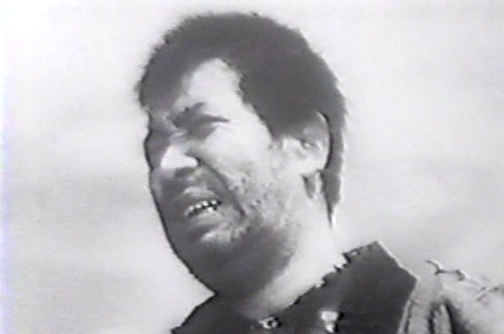
(Continued from Page 2)
The novel The Soil was a Japanese variant on the tradition of late 19th and early 20th Century naturalistic fiction in the West, which included, for example, the work of Jack London and Frank Norris and which was strongly influenced by the novels of Zola. For example, a crucial turning point in the book completely missing from the extant film (at least in the version I’ve seen) is Kanji’s wife Oshina’s self-induced abortion. Oshina had terminated her pregnancy by going off in the fields alone, resulting in her contracting an infection from the soil, leading directly to her death – an event that changes Kanji’s personality for the worse. The meaning of the book’s title is thus clear: “the soil” represents the natural world, which sustains the lives of the peasants, but is just as often the instrument of their destruction… and self-destruction.
The meaning of the film, however, though it follows the book’s plot closely, appears to be somewhat more ambiguous and complex. Earth unsentimentally celebrates the richness of the natural world. But, despite the horrendous fire that serves as the narrative’s climax, the truly destructive energy in the film comes not from nature, but from people. Kanji turns away from the community on which his survival depends, and thus not only nearly destroys his father-in-law, but almost irreparably alienates his beloved daughter and son as well.
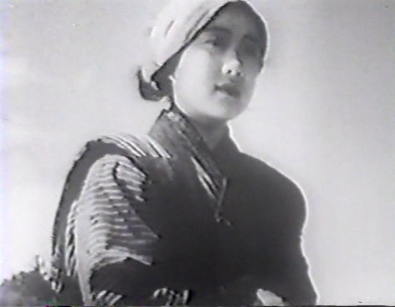
I’ve never seen a less idealized vision of the often brutal reality of farm work than depicted in this film. Such work – raking, planting, threshing, water-carrying and harvesting – looks hard because it is hard. And Uchida refuses to spare his actors, who are shown carrying out these tasks in real time.
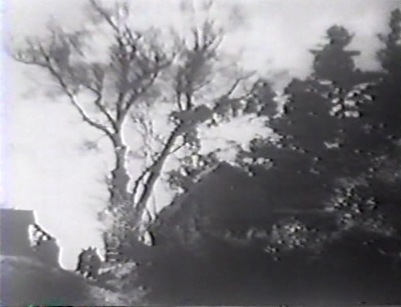
Otsugi, especially, never stops working. When she’s not in the fields with her father, she’s cooking at home or tending to her grandfather or her brother (or all at once), without complaint. Thus, one of the film’s most poignant moments is the ferry boat scene, in which Otsugi, working beside her father, watches as her friends move out of the village to a better life as mill workers, and we feel most keenly the waste of her young life in rough and futile toil.
And that toil is, mostly, futile, because it is carried out for the benefit of (relatively) rich people, not for herself or her loved ones. In a fascinating sequence, we see father and daughter filling up large bags with the rice they’ve cultivated with such effort, in preparation for offering it all to the landlord’s wife. This represents their yearly payment for the right to till their own land for a subsistence living.
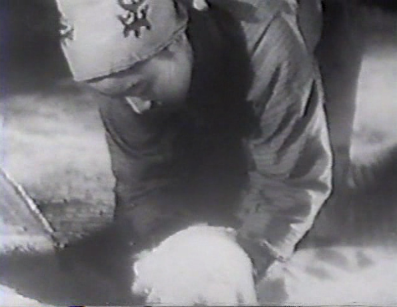
“If only that [rice] was all ours. That would be great!” Otsugi cries, to which Kanji, characteristically, replies with a warning to the girl not to reveal to the landlord’s wife that the harvest was as bountiful as it was. (The implication is that Kanji has secretly kept a little of the rice crop he’s harvested for his family’s own use.) But the girl can’t bear to part with any of the precious rice and wishes they could keep it just one more day. We then see the girl, almost sacramentally, cupping the loose rice in her hands and letting it slide through her fingers.
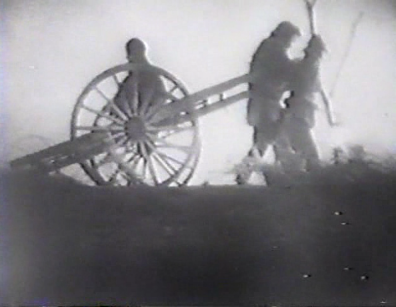
A little later, we see the family bringing all this rice to the landlord’s wife, who congratulates them on being the most productive of all the peasant families. She then “generously” offers them a meal with saké… though they could easily have enjoyed fifty such meals with the enormous quantity of rice they’ve just given this woman. Kanji, drunk, goes home with his family happy, chortling in self-satisfaction, unconscious of these contradictions within his rigidly hierarchical world.
The character of the protagonist’s father-in-law, Uhei (a.k.a., Ukichi), and Kanji’s feelings of hatred towards him, must be comprehended if the narrative as a whole is to be understood. In The Soil, Uhei, during the years of Kanji’s marriage to his wife, Oshina, is depicted as a bully to his son-in-law. Always disapproving of the marriage, the older man, whenever he visited the couple, went out of his way to make Kanji feel small – which was not hard to do, given Uhei’s imposing size and physical strength, even in late middle age. Nagatsuka in the book repeatedly mentions how intimidated Kanji had always felt in the presence of his father-in-law.
In the film, this sense of the overpowering nature of the old man is retained in the scene early in the narrative when Kanji complains to Otsugi about the debts that her grandfather has saddled him with, and Uhei – entering at that moment and overhearing the conversation – berates Kanji in front of Otsugi, so that neither father nor daughter have the courage to utter a word. The camera dollies forward and closes in on Kanji, stressing his silent rage and humiliation.
In the novel, what had made this tense standoff bearable was the link between the two men represented by Oshina. But when she suddenly dies, that link is broken, leading to the deterioration of the already sour relationship between the two men. Furthermore, the old man, now enfeebled, can no longer work in his native village and is thus forced to come to Kanji’s house to live. This combination of factors – the hostility between them going back to the beginning of Kanji’s marriage, the very presence of Uhei as yet another hungry mouth to feed, the old man’s debts and, not least of all, Uhei’s unwillingness to submit to Kanji’s authority – creates a volatile situation that literally explodes at the film’s fiery climax.
From Kanji’s point-of-view, Uhei is an intolerable cross to bear, whose very existence dramatically worsens his already harsh life. From Uhei’s point-of-view, Kanji is a cruel, even inhuman son-in-law, utterly devoid of the deference and devotion that a Japanese man (according to Confucian tenets) is traditionally obliged to display towards an older relative. Furthermore, the village consistently sides with the old man, which ironically places the survival of Kanji and his family in jeopardy.
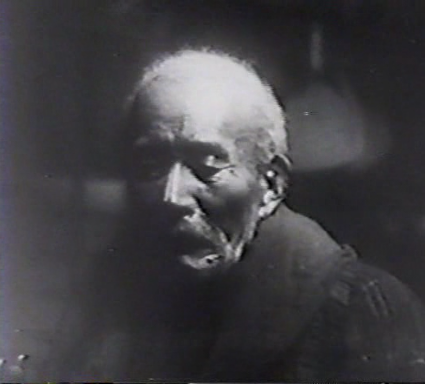
The choice of Yamamoto Kaichi to portray this crucial character was a stroke of casting genius. Only in his early sixties when he appeared in the film, but looking much older, Yamamoto had once been the manager of a touring acting company, so he exudes a certain natural authority. All the existing photos of the actor not taken from this film show him in Western clothes; he seems in real life to have been about as far from an illiterate peasant as can be imagined. Yet the performer totally disappears into the character, managing to convey both Uhei’s past strength and his current enfeeblement. Thus, Uhei is convincing not only when he scolds Kanji or Otsugi, but also when he complains to his friend Heizo and the other villagers about his mistreatment, a pathetic figure wallowing in self-pity.
This is the kind of film that is sometimes naïvely called “plotless” by reviewers. But, as in the case of the novel, despite the inclusion of many merely anecdotal episodes, the dramatic conflict between the two main male characters is skillfully established and carefully developed, making the climax that much more devastating.
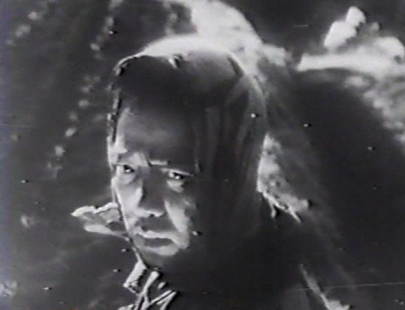
Uchida in this movie, more even than most of his pictures, makes many unusual and even startling choices in camera placement and editing. As Dan Sallitt has rightly noted, Uchida “seems driven to make every scene a coup.” The segment in which Kanji is accused (correctly) of stealing his neighbor’s grain begins with an amazing close-up of the terrified protagonist, who then is viewed, without a cut, running away through the fields into the far distance, his diminishing figure seen in tight focus the whole time.
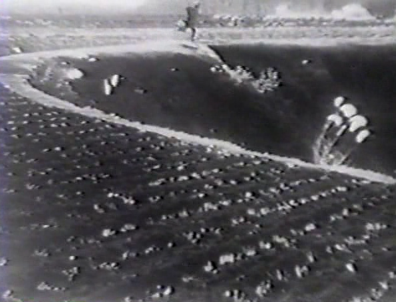
The long sequence involving Kanji’s theft ends, by contrast, in near-total stillness. We are inside a barn where Kanji is still hiding from the police, but at first we don’t see him, only the barn door, viewed in long shot. From outside, beyond the door, we hear the strangely childlike voice of the landlord’s wife telling Kanji that the suspicious policeman has gone: the coast is clear. Only then does Kanji appear, on a ladder at the extreme upper-right corner of the frame.
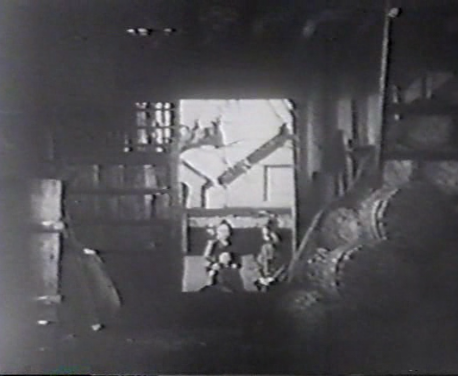
He finally climbs down and opens the barn door, letting in the light, revealing not only the landlord’s wife, but his own children, Otsugi and Yokichi, standing at the threshold. The embarrassed peasant profusely apologizes and grovels before the landlord’s wife who so generously protected him from the law, so that he’s nearly invisible at the bottom of the frame.
It’s difficult to think of another director of that period who would not have inserted any cuts nor reframed the shot to make his leading actor more prominent. The minimalist conception of this scene – which stresses Otsugi’s dignity and her father’s utter lack of it – strikes me as very modern, and its sophisticated use of both offscreen space and sound feels very contemporary.
The sequence in which the two main aspects of the movie – the anthropological and the psychological – blend and fuse most successfully is the amazing night wedding sequence, the longest episode in the surviving film. The peasant customs displayed are fascinating, particularly regarding gender roles. The village women in their day-to-day lives work all the time, yet they are not allowed to relax prior to the wedding. In a long shot from above, we see them in the farmhouse cooking the feast while the lazy village men invade the space to take their food and just as quickly withdraw.
Otsugi is then seen working in this communal kitchen with the other women. Kanji, who had permitted his daughter to attend the wedding, perversely sends the boy, Yoshiki, to bring her back home before the nuptials have even begun, afraid that the village boys will try to seduce her. But the usually loyal and obedient daughter for once resists her father. This leads the villagers to gossip (as they do in the book) about Kanji’s unhealthy – and suspicious – possessiveness as a parent, and how it’s ruining the young girl’s life.
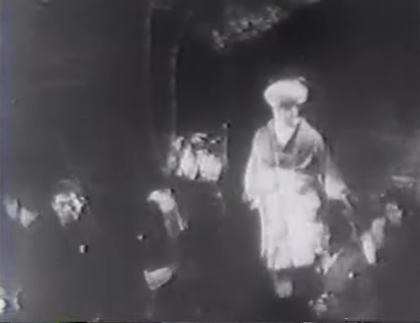
There follows a magical vision, in long shot, of the bride riding sidesaddle on a horse down the path, as a male singer chants a surprisingly mournful hymn. The local men approach with lanterns to get a better view of the bride (who apparently hails from another village) as she dismounts and then walks silently to the house in which the ceremony will take place. We seem to be observing a solemn, centuries-old rite, and begin to grasp how these rituals give meaning to the peasants’ cruel lives.
Kanji, trapped in the purgatory of his obsessions, has effectively exiled himself from his community, even though he works side-by-side with its members in the fields. During the wedding, he is seen totally alone, a dark figure shrouded by darkness, waiting outside his house for the return of Otsugi. He rejects the siren song of the wedding chanter, whom he can hear even from this distance, preferring his own grim solitude.
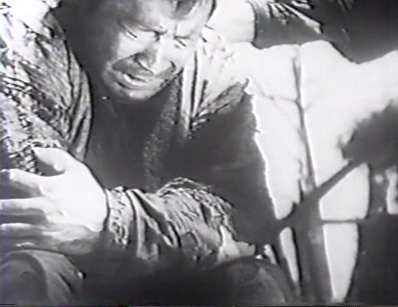
As the dirty, perpetually scowling Kanji, Uchida’s regular leading man of this period, Kosugi Isamu, is unrecognizable as the same actor who portrayed the spit-and-polish Officer Itami in Police Officer six years before, or the fastidious salaryman Tokumaru in Unending Advance from just two years prior. And it’s to the great credit of both actor and director that this very unpleasant character – a misanthrope, thief and domestic despot, as well as something of a miser – turns out to be as sympathetic as he is.
It’s been suggested that Kanji’s resentment towards old Uhei is actually a convenient outlet for the rage he subconsciously feels for the landlord and his wife, and by extension the entire feudal system. This interpretation makes a lot of sense. Unable to rebel against his real oppressors, who are too strong, Kanji responds by treating a broken-down old man as his nemesis. But however the character is perceived, Kosugi’s Kanji creates an indelible image of rural misery and self-torment.
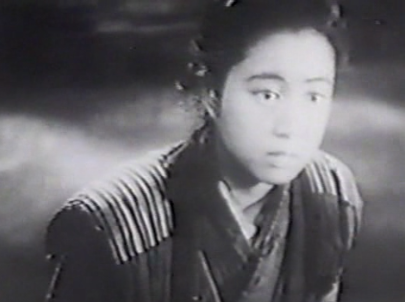
As is also true of The Soil, the character of the teenage daughter, Otsugi, is the heart and soul of the narrative. Kazami Akiko’s performance in this role is a remarkable piece of acting, particularly for a young newcomer: passionate, totally credible and deeply moving. Furthermore, she conveys a certain innocence which is most appealing. Because of Kazami, we’re not observing this family and this community as detached outsiders, but as emotionally-involved spectators.
(Continued on Page 4)
[…] adaptation of Nagatsuka Takashi’s novel The Soil, though he wasn’t cast in Uchida’s 1939 film version. After making his movie debut in 1936, he amassed over 250 film and TV credits over six decades. […]
[…] Uchida's Earth (土), his 1939 masterpiece Aug 2, 2021 / 12:21 pm Reply […]
[…] literary adaptation and the first of two Uchida films in three years (the second one was Earth (Tsuchi)) to top the KJ poll. The ultimate origin of this work was a published story by, of all […]